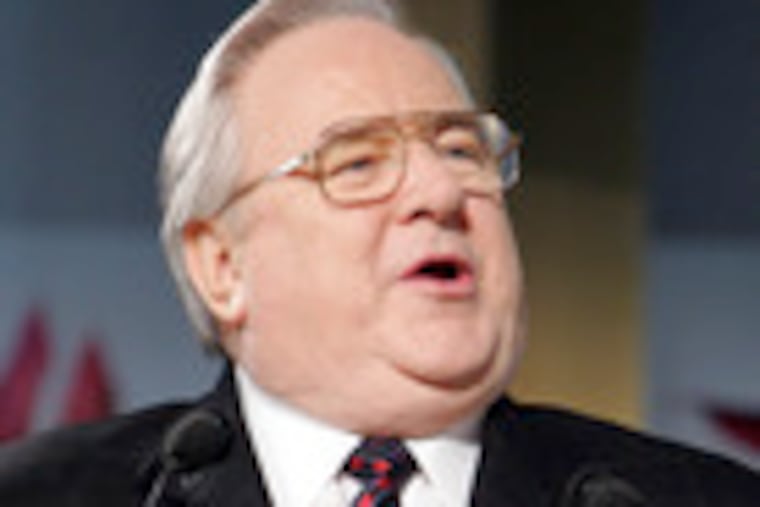Rev. Jerry Falwell, 73; built a force of faith
LYNCHBURG, Va. - The Rev. Jerry Falwell, 73, who used the power of television to transform the religious right into a mighty force in American politics, died yesterday after he was stricken at his campus office.

LYNCHBURG, Va. - The Rev. Jerry Falwell, 73, who used the power of television to transform the religious right into a mighty force in American politics, died yesterday after he was stricken at his campus office.
The founder of the Moral Majority was discovered without a pulse at Liberty University and pronounced dead at a hospital an hour later. Carl Moore, Mr. Falwell's physician, said he had a heart condition and presumably died of a heart-rhythm abnormality.
Driven into politics by the 1973 Supreme Court ruling that established the right to an abortion, Mr. Falwell founded the Moral Majority in 1979. One of the conservative lobbying group's greatest triumphs came a year later, when Ronald Reagan was elected president.
Mr. Falwell credited the Moral Majority with getting millions of conservative voters registered, aiding in Reagan's victory and giving Republicans control of the Senate.
"I shudder to think where the country would be right now if the religious right had not evolved," he said when he stepped down as Moral Majority president in 1987.
Fellow TV evangelist Pat Robertson, a onetime GOP candidate for president, declared Mr. Falwell "a tower of strength on many of the moral issues which have confronted our nation."
The rise of Christian conservatism - and the Moral Majority's full-throated condemnation of homosexuality, abortion and pornography - made Mr. Falwell perhaps the most recognizable figure of the evangelical right, and one of the most controversial.
Over the years, Mr. Falwell waged a landmark libel case against Hustler magazine founder Larry Flynt over a raunchy parody ad, and created a furor in 1999 when one of his publications suggested that the purse-carrying Teletubbies character Tinky Winky was gay.
Matt Foreman, executive director of National Gay and Lesbian Task Force, extended condolences to those close to Mr. Falwell but added: "Unfortunately, we will always remember him as a founder and leader of America's antigay industry, someone who exacerbated the nation's appalling response to the onslaught of the AIDS epidemic, someone who demonized and vilified us for political gain, and someone who used religion to divide rather than unite our nation."
The 1980s marked the religious conservative movement's high-water mark. In more recent years, Mr. Falwell had become a problematic figure for the GOP. His remarks a few days after Sept. 11, 2001, essentially blaming feminists, gays and liberals for bringing on the terrorist attacks, drew a rebuke from the White House, and he apologized.
His declining political star seemed apparent when he was quietly led in and out of the Republican Party's 2004 national convention. Just four years earlier in Philadelphia, he was invited to pray from the rostrum.
The big, blue-eyed preacher with a booming voice started a fundamentalist church in an abandoned bottling plant in Lynchburg in 1956 with just 35 members. He built it into a religious empire that included The Old Time Gospel Hour carried on TV stations around the country. In 1971, he founded Lynchburg Baptist College, which later became Liberty University.
From his living room, he broadcast his message of salvation and raised the donations that helped his ministry grow.
"He was one of the first to come up with ways to use television to expand his ministry," said Robert Alley, a retired University of Richmond religion professor who studied and criticized Mr. Falwell's career.
Mr. Falwell had once opposed mixing preaching with politics but changed his views. The Moral Majority grew to 6.5 million members and raised $69 million as it supported conservative politicians and railed against abortion, homosexuality, pornography, and bans on school prayer.
Mr. Falwell became the face of the religious right, appearing on national magazine covers and on talk shows. In 1983, U.S. News & World Report named him one of the 25 most influential people in America.
"Jerry's passions and convictions changed the course of our country for the better over the last 20 years," said James Dobson, founder of the conservative Christian Focus on the Family ministry. "It was Jerry who led an entire wing of Christianity, the fundamentalist wing, away from isolation and into a direct confrontation with the culture."
In 1984, Mr. Falwell sued Hustler for $45 million, charging that he was libeled by a liquor-ad parody that quoted him as saying he lost his virginity to his mother in an outhouse.
A federal jury found the fake ad did not libel him but awarded him $200,000 for emotional distress. The award was overturned in a landmark 1988 U.S. Supreme Court decision that held that even pornographic spoofs about a public figure enjoyed First Amendment protection.
With Mr. Falwell's high profile came frequent criticism, even from fellow ministers. The Rev. Billy Graham once rebuked him for political sermonizing on "non-moral issues."
Mr. Falwell quit the Moral Majority in 1987, saying he was tired of being "a lightning rod" and wanted to devote his time to his ministry and Liberty University.
In his autobiography, he wrote that his father and his grandfather were militant atheists. He said his father made a fortune off his businesses - including bootlegging during Prohibition.
As a student, Mr. Falwell was a star athlete and a prankster who was barred from giving his high school valedictorian's speech after he was caught using counterfeit lunch tickets.
He became a born-again Christian at 19.
"My heart was burning to serve Christ," he once said in an interview. "I knew nothing would ever be the same again."
Mr. Falwell is survived by his wife, Macel, his two sons, and a daughter. His funeral is planned for Monday.